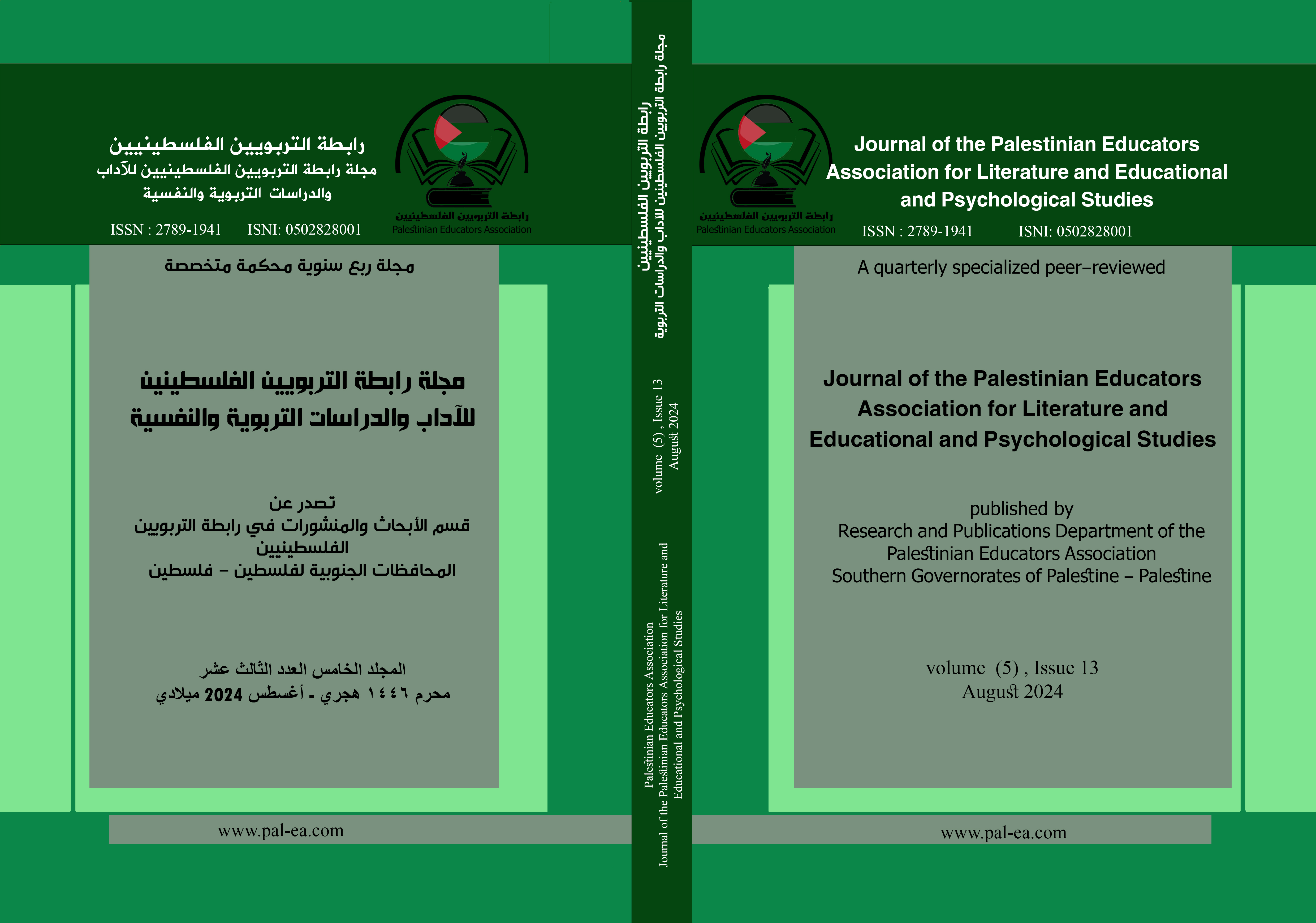The role of the school in developing a culture of research, discovery and development among gifted students - the Malaysian Friendship Secondary School for Girls in the Sabah Al-Khair suburb as a model -
Keywords:
Culture of research - discovery - development - gifted students)Abstract
This research aims to study the school's role in promoting a culture of research, discovery, and development among gifted students at the Malaysian Friendship Girls' Secondary School in the Sabah Al-Khair suburb, and to understand how these efforts affect the development of students' skills and abilities. A combination of personal interviews with teachers and students, direct observation of relevant school activities, as well as analysis of school documents and reports was used.
The study included a sample of teachers specialized in teaching gifted students, and a sample of gifted students who participate in research and development programs at school. The results showed that school programs and activities directed towards research and discovery may contribute significantly to enhancing students’ skills in these areas, and motivating them to innovate and think critically. The results also indicated that continuous interaction with inspiring teachers has a positive impact on the development of gifted students.
The study recommended the need to reduce the clerical burden on teaching staff to help create a comfortable psychological atmosphere for students and devote themselves to developing those talents, and the need for more interaction between the school and the local community to support educational programs, and develop strategies to evaluate the effectiveness of educational activities, in addition to providing continuous support to teachers to enhance their skills. In teaching research and development to gifted students.
Downloads
References
References
● [1] Rebecca D. Napier. Jane M. Jarvis. Julie Clark. R. John Halsey. (2023). Influences on Career Development for Gifted Adolescent Girls in Selective Academic Programs in Australia. https://journals.sagepub.com/doi/10.1177/00169862231201604
● [2] Sally M. Reis. (2015). Reconsidering Regular Curriculum for High Achieving Students, Gifted Underachievers, and Relationship between Gifted and Regular Education. https://gifted.uconn.edu/schoolwide-enrichment-model/reconsidering_regular_curriculum/
● [3] The School Counselor and Equity for All Students. (2024). https://www.schoolcounselor.org/Standards-Positions/Position-Statements/ASCA-Position-Statements/The-School-Counselor-and-Equity-for-All-Students
● [4] NYU Web Communications. (2024). Race Influences Teachers' Referrals to Special and Gifted Education, Finds Steinhardt Study. https://www.nyu.edu/about/news-publications/news/2016/october/race-influences-teachers-referrals-to-special-and-gifted-educati.html
● [5] Basha Krasnoff. (2016). Culturally Responsive Teaching A Guide to Evidence-Based Practices for Teaching All Students Equitably. https://educationnorthwest.org/sites/default/files/resources/culturally-responsive-teaching.pdf
● [6] Reis. S. & McCoach. D.. (2000). The underachievement of gifted students: What do we know and where do we go?. https://www.davidsongifted.org/gifted-blog/the-underachievement-of-gifted-students-what-do-we-know-and-where-do-we-go/
● [7] Quality Standards Meeting the Definition of a High Performing Charter School. (2013). https://www.marylandpublicschools.org/programs/Documents/Charter-Schools/Resources/QualityStandardsCharterSchools2013.pdf
● [8] New York State Education Department. (2019). Culturally Responsive-Sustaining Education Framework. https://www.nysed.gov/sites/default/files/programs/crs/culturally-responsive-sustaining-education-framework.pdf
● [9] Ministry of Education Malaysia. (2013). Malaysia Education Blueprint 2013 - 2025. https://planipolis.iiep.unesco.org/sites/default/files/ressources/malaysia_blueprint.pdf
● [10] Figgett. Katrina. (2019). Resource Guide for the Education of Gifted Students in Florida. https://www.fldoe.org/core/fileparse.php/5660/urlt/RGEGSF.pdf
● [11] Francesca Gottschalk, Crystal Weise. (2023). Digital equity and inclusion in education: An overview of practice and policy in OECD countries. https://one.oecd.org/document/EDU/WKP(2023)14/en/pdf
● [12] Reding. Cheryl. (2020). Building Leadership program standards June 09, 2020. https://www.ksde.org/Portals/0/TLA/Program%20Standards/Building%20Leadership%20Standards%20final%2006-09-2020.pdf?ver=2020-06-15-165643-683
● [13] Kyung Hee Kim. (2011). The Creativity Crisis: The Decrease in Creative Thinking Scores on the Torrance Tests of Creative Thinking. https://www.nesacenter.org/uploaded/conferences/SEC/2013/handouts/Kim_Creativity-Crisis_CRJ2011.pdf
● [14] College of Education Course Descriptions. (2024). https://www.fau.edu/registrar/university-catalog/catalog/educationdes/
● [15] The National Working Group on Advanced Education. (2023). Building a Wider, More Diverse Pipeline of Advanced Learners. https://fordhaminstitute.org/national/research/building-wider-more-diverse-pipeline-advanced-learners
● [16] Valued Gateway Client. (2013). GIFTED STUDENTS: RECOMMENDATIONS FOR TEACHERS. https://www.education.udel.edu/wp-content/uploads/2013/01/GiftedStudents.pdf
● [17] Justin Raudys. (2018). 11 Real Ways to Build a Positive School Culture. https://www.prodigygame.com/main-en/blog/school-culture/
● [18] Michael R Doran, Katherine Christian, Wendy Wright, Carolyn Johnstone, Jo-ann Larkins. (2021). Research Culture: A survey of early-career researchers in Australia. https://elifesciences.org/articles/60613
● [19] School Integration. (2023). https://www.aft.org/ae/fall2019/kahlenberg_potter_quick
Published
Issue
Section
License
Copyright (c) 2024 ايناس فؤاد أبو فرحة (مؤلف)

This work is licensed under a Creative Commons Attribution-NonCommercial-ShareAlike 4.0 International License.
The Journal of the Palestinian Educators Association for Literature, Educational and Psychological Studies
E-issn: 2789-1941
Authors retain Copyright
The Journal of the Palestinian Educators Association for Literature, Educational and Psychological Studies allows Authors retain Copyright and grant the journal right of first publication with the work simultaneously licensed under a Creative Commons Attribution (CC-BY) 4.0 License that allows others to share the work with an acknowledgment of the work’s authorship and initial publication in this journal.
Provided they are the owners of the Copyright to their work, authors are able to enter into separate, additional contractual arrangements for the non-exclusive distribution of the journal’s published version of the work (e.g., post it to an institutional repository, in a journal or publish it in a book), with an acknowledgment of its initial publication in this journal.
Authors are permitted and encouraged to post their work online (e.g., in institutional repositories, disciplinary repositories, or on their website) prior to
and during the submission process.










